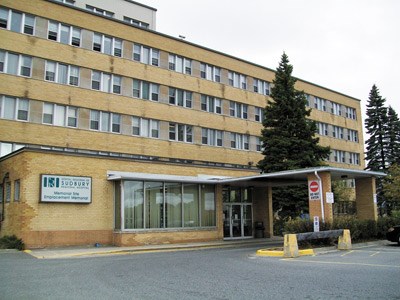The North East Local Health Integration Network (NE LHIN) is involved in ongoing discussions with the province about the possibility of keeping the Memorial Hospital site open longer than expected as an alternate level of care (ALC) facility.
Last week, based on projections of rapidly increasing ALC patient numbers, Sudbury Regional Hospital’s board of directors recommended the 136-bed ALC facility at the Memorial site remain open until 2013, instead of the current closing date of early 2011.
The board also recommended the 36 beds due to close at the Memorial site this month — as new nursing home beds are opened at Pioneer Manor — should remain open until February 2011.
ALC patients are those who no longer need acute care, but remain in hospital beds because they cannot find appropriate care, such as nursing home beds, within the community.
Terry Tilleczek, the NE LHIN’s senior director of planning, integration and community engagement, said his organization supports the idea of keeping the Memorial site open as a “stop gap” measure to deal with the ALC crisis, although he didn’t want to put a timeframe on how long it should stay open.
As for putting a stop to the closure of 36 ALC beds this month, Tilleczek said that, as things stand right now, these beds will gradually be closed, but the NE LHIN will continue to monitor the impact on the hospital.
“We’re working with the hospital,” he said. “They’re around our table. We’ve got Pioneer Manor there, we’ve got physician input, and we’ve got the CCAC. This is a real community response to this challenge.”
When asked when the NE LHIN expects an answer from the province about additional funding for the Memorial site, Tilleczek said “We’ll tell you when we have that.”
Tilleczek, also the co-chair of the Sudbury ALC Steering Committee, a group of stakeholders examining the solutions to the ALC crisis, said the NE LHIN is looking at some longer-term strategies to deal with the problem.
One of these strategies is the “home first” program, where after frail elderly patients receive acute care at the hospital, they would be sent home with extensive home care services, instead of waiting in hospital for a nursing home bed (where they would become an ALC patient).
“They can make that very important life decision regarding whether or not they go into a long-term care home in their actual home,” Tilleczek said.
“What we have found in other parts of the province is that some of those families actually keep their loved ones at home, and recognize that with enhanced home care, and other familial supports, they can actually remain at home as opposed to going into a long-term care home.”
Join Sudbury.com+
- Messages
- Post a Listing
- Your Listings
- Your Profile
- Your Subscriptions
- Your Likes
- Your Business
- Support Local News
- Payment History
Sudbury.com+ members
Already a +member?
Not a +member?
Sign up for a Sudbury.com+ account for instant access to upcoming contests, local offers, auctions and so much more.
